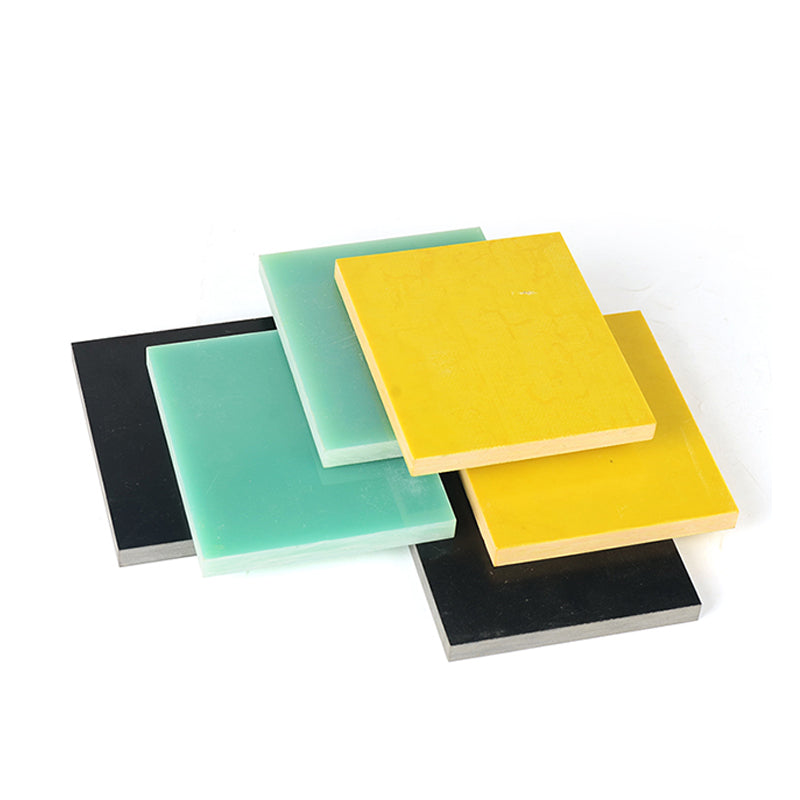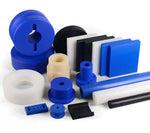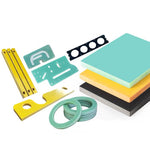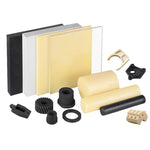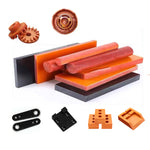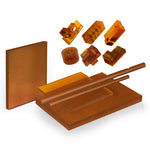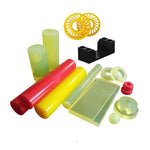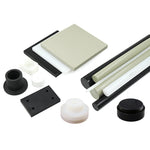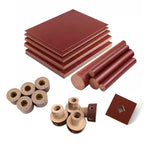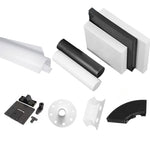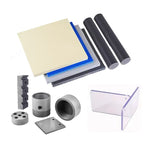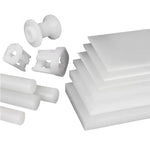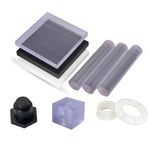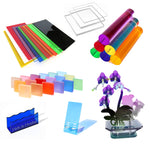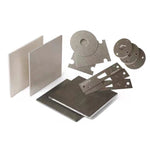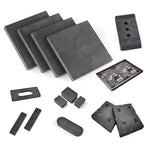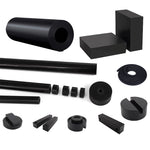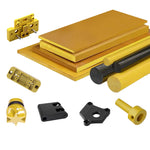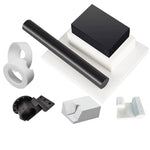Transform Your Design Into Precision Reality
Custom plastic machining with Swiss precision




Precision Bakelite & Garolite CNC Machining Services
Precision Bakelite & Garolite CNC Machining Services
Transform paper-based Bakelite and cotton-based Garolite phenolic laminates into high-precision custom components. From electrical insulators to mechanical gears, we deliver ±0.03mm tolerances with NO minimum order quantity.

Get Your Custom Phenolic Parts in 3 Simple Steps
Choose Your Material
Bakelite for electrical insulation or Garolite for mechanical strength
Select CNC Process
Milling, turning, drilling, threading, or laser cutting
Receive Quote in 8 Hours
With free DFM feedback and competitive pricing
Bakelite vs. Garolite: Choose the Right Phenolic Material
Understanding the fundamental difference between paper-based and cotton-based phenolic laminates is critical to selecting the optimal material for your custom machined components.

Bakelite (Paper Phenolic)
Multi-layer kraft paper impregnated with phenolic resin, cured under high heat and pressure. The industry standard for electrical insulation applications since 1907.
- Superior Dielectric Strength: 400-500 V/mil for high-voltage applications
- Dimensional Stability: Maintains tolerances across temperature fluctuations
- Heat Resistance: Continuous operation up to 120°C (248°F)
- Cost-Effective: Excellent performance-to-price ratio
- Smooth Surface: Minimal texture for professional appearance
Typical Applications: PCB test fixtures, terminal boards, transformer components, electrical insulators, switch panels
Learn More About Bakelite Machining →
Garolite (Cotton Phenolic)
Woven cotton or linen fabric layers impregnated with phenolic resin. Dramatically superior mechanical properties make it ideal for demanding structural applications.
- Exceptional Tensile Strength: 70-90 MPa vs. 40-50 MPa for paper grades
- Superior Impact Resistance: Withstands shock loads and vibration
- Excellent Wear Properties: Low friction, self-lubricating characteristics
- Outstanding Machinability: Complex features without cracking
- High Compressive Strength: Ideal for load-bearing applications
Typical Applications: High-strength gears, bearings and bushings, wear pads, structural brackets, jigs and fixtures
Learn More About Garolite Machining →| Property | Bakelite (Paper Phenolic) | Garolite (Cotton Phenolic) |
|---|---|---|
| Reinforcement Base | Kraft paper layers | Woven cotton/linen fabric |
| Primary Strength | Electrical insulation | Mechanical toughness |
| Dielectric Strength | 400-500 V/mil (Excellent) | 200-300 V/mil (Good) |
| Tensile Strength | 40-50 MPa | 70-90 MPa |
| Impact Resistance | Moderate | Excellent |
| Machinability | Good | Excellent (complex features) |
| Thread Strength | Limited (inserts recommended) | Excellent (holds threads well) |
| Surface Appearance | Smooth, uniform | Visible woven texture |
| Typical Cost | Lower (cost-effective) | Moderate (premium performance) |
Quick Decision Guide: Choose Bakelite when electrical insulation is paramount and mechanical loads are moderate. Choose Garolite when mechanical strength, impact resistance, or complex machined features are critical requirements.
Not Sure Which Material? Ask Our Engineers →Advanced CNC Machining Services for Phenolic Laminates
Machining phenolic thermoset materials presents unique challenges: abrasive fibers rapidly dull cutting tools, brittleness causes chipping under improper parameters, and fine dust requires specialized extraction. Our dedicated phenolic machining capabilities overcome these challenges to deliver precision components consistently.
Precision CNC Milling for Phenolic Laminates
-
Tolerance Capability
±0.03mm on critical dimensions -
Surface Finish
Ra 0.8-3.2μm achievable -
Max Workpiece Size
1200mm × 800mm × 100mm -
Min Feature Size
0.5mm width slots and pockets
Common Milled Features: Precision pockets for electronic components, mounting holes with tight positional tolerances, complex contoured surfaces for custom fixtures, slots and channels for cable management.
Learn More About CNC Milling Services →

CNC Turning & Threading for Cylindrical Phenolic Components
-
Max Turning Diameter
300mm -
Max Turning Length
1000mm -
Concentricity
±0.02mm achievable -
Surface Finish
Ra 1.6-3.2μm standard -
Thread Capability
Metric M2-M24, Imperial 4-40 to 1"-12
Common Turned Components: Precision insulating spacers and standoffs, custom bushings and sleeves, insulating shafts and dowels, threaded components with fine-pitch threads, bearing housings.
Learn More About CNC Turning Services →

Our CNC Turning Process in Detail

CNC lathe turning Garolite rod with precision control

Carbide insert achieving Ra 1.6μm surface finish

Fine-pitch threading with specialized tooling
Precision Drilling & Delamination-Free Hole Making
-
Hole Diameter Range
0.8mm to 50mm -
Hole Depth Capability
Up to 20× diameter for small holes -
Positional Accuracy
±0.05mm standard, ±0.02mm precision -
Delamination-Free
Compression drill bits for FR4/G10
Critical Applications: PCB test fixture drilling pads with hundreds of precision holes, terminal board mounting hole patterns, component mounting brackets requiring exact hole locations.
View All CNC Machining Capabilities →

Additional Machining & Finishing Services
Laser Cutting & Profiling
For thin phenolic sheet components requiring intricate profiles or tight nesting efficiency. Max sheet 1500×3000mm, thickness 0.5-12mm, kerf width ~0.2mm. Ideal for gaskets, insulating washers, and custom-shaped barriers.
Surface Finishing Options
As-machined standard (Ra 1.6-3.2μm), sanding & polishing (Ra 0.8-1.6μm), edge deburring, chamfering & beveling, surface coating (low-temp powder coating), laser/mechanical engraving for part identification.
Secondary Operations
Threaded insert installation (press-fit or heat-set brass), adhesive bonding of multi-component assemblies, hardware installation (studs, standoffs, fasteners), simple sub-assembly services, packaging and kitting.
Proven Expertise Across Demanding Industries
Our precision-machined Bakelite and Garolite components serve critical functions across industries where electrical insulation, mechanical strength, and dimensional stability are essential requirements.

Electronics & Electrical Equipment
Our Solution: We machine custom Bakelite Grade XXX test fixture plates using specialized compression drill bits for delamination-free holes. Our multi-axis CNC ensures precise hole positioning, while the paper phenolic's superior dielectric strength (400-500 V/mil) provides reliable electrical isolation.
- PCB Test Fixtures & ICT Jigs: Custom drilling pads with precision probe holes
- Terminal Boards: Insulating components maintaining safe electrical separation
- Transformer Components: Insulating spacers and coil separators
- Switch Panels: Insulating barriers and divider plates

Aerospace & Defense Applications
Our Solution: We fabricate custom FR4 flame-retardant phenolic brackets (UL 94V-0 rated) using precision CNC milling. The epoxy-glass laminate's superior dimensional stability and flame resistance meet aerospace requirements while delivering 30-50% weight savings versus metals.
- Aircraft Interior Components: FAA-compliant cabin parts
- Electrical Insulation: High-voltage insulators for demanding conditions
- Structural Brackets: Lightweight components with high strength-to-weight ratios
- Radar & Avionics Housings: Non-metallic enclosures

Industrial Machinery & Equipment
Our Solution: We machine custom Garolite CE grade wear pads and guide rails that provide self-lubricating, low-friction performance without external lubricants. The cotton phenolic's exceptional wear resistance and chemical stability deliver extended service life.
- Custom Gears & Sprockets: Wear-resistant components for light loads
- Bearings & Bushings: Self-lubricating components
- Wear Pads & Guide Rails: Low-friction components for conveyor machinery
- Jigs & Fixtures: Durable tooling with non-marring properties
Why Leading Companies Choose BeePlastic
Machining phenolic thermoset materials requires specialized knowledge. Here's why industry leaders trust us for their critical components.
No Minimum Order Quantity
Single prototypes to production volumes—we machine any quantity with the same precision and quality. Perfect for design validation, emergency replacements, or specialty components.
Order 1 piece or 10,000 pieces8-Hour Quotation Turnaround
Submit drawings and receive detailed quotes typically within one business day, including pricing and DFM recommendations. Rapid prototyping available: simple parts in 3-5 days.
Same-day response for urgent projectsSpecialized Products Expertise
Deep material science knowledge of phenolic formulations. We select optimal cutting parameters, anticipate defects, and provide DFM feedback to improve part success rates.
10+ years phenolic machining experienceAdvanced CNC Equipment
Multi-axis CNC centers (3/4/5-axis), carbide & diamond tooling for abrasive materials, industrial dust collection, and optical measurement. ISO 9001:2015 certified processes.
±0.03mm tolerance capabilityManufacturing Advantage
Competitive pricing typically 30-50% lower than Western manufacturers for equivalent quality. Combines cost efficiency with international quality standards.
Save 30-50% on component costsComprehensive Quality Control
Incoming material inspection, first article verification, in-process monitoring, and 100% final dimensional inspection. Every part meets specifications.
Zero-defect quality commitmentDesign Guidelines for Phenolic Machined Parts
Designing components from phenolic thermoset materials requires different considerations than metals or thermoplastics. Follow these guidelines to ensure your parts are manufacturable and cost-effective.
Minimum Wall Thickness & Corner Radii
- Bakelite (paper): 1.5mm minimum, 3mm+ recommended
- Garolite (cotton): 2.0mm minimum, 4mm+ recommended
- Corner radii: Avoid sharp internal corners (0° radius)
- Min internal radius: 0.5mm for non-critical features
- External corners: 0.5mm × 45° chamfers recommended
Hole Design & Drilling Guidelines
- Min hole diameter: 0.8mm limit, 1.5mm+ recommended
- Hole spacing: Min 2× hole diameter center-to-center
- Edge distance: Min 3mm from hole center to edge
- Blind hole depth: Max 10× hole diameter
- Delamination prevention: Specify for critical through-holes
Threading Considerations
- Thread pitch: Use coarse-pitch threads (UNC/coarse metric)
- Min engagement: 1.5× bolt diameter for strength
- Edge distance: Min 1.5× thread major diameter
- High-stress: Specify heat-set brass threaded inserts
- Avoid: Very fine-pitch threads in native material
Tolerance & Dimensional Considerations
- Standard tolerances: ±0.1mm (general dimensions)
- Precision tolerances: ±0.03mm (critical dimensions)
- Hole position: ±0.05mm typical
- Flatness: 0.1mm per 100mm typical
- Recommendation: Only specify tight tolerances where required
Downloadable Design Resources
Complete technical reference with material properties and tolerances
Decision tree for choosing Bakelite, Garolite, or FR4
Self-assessment checklist to optimize designs for manufacturability
Frequently Asked Questions
What's the actual difference between Bakelite and Garolite?
The fundamental difference is the reinforcement material. Bakelite uses paper layers and excels at electrical insulation with superior dielectric strength (400-500 V/mil). Garolite uses woven cotton or linen fabric and delivers dramatically superior mechanical strength (70-90 MPa tensile).
- Choose Bakelite when: Electrical insulation is priority.
- Choose Garolite when: Mechanical strength or impact resistance is critical.
Not sure? Ask our engineers →
Can you machine Bakelite/Garolite without cracking?
Yes. Phenolic materials are brittle, but we use specialized carbide tooling, optimized cutting parameters (feed rates, spindle speeds), and support fixtures to prevent cracking. Minor edge fraying in Garolite is normal but can be finished if required.
Concerned about quality? Request a sample →
What tolerances can you realistically achieve?
Our standard machining tolerances are ±0.1mm. For critical dimensions, we can achieve ±0.03mm. Hole positional tolerances are typically ±0.05mm. Extremely tight tolerances across entire parts are not recommended for cost-efficiency.
Need specific tolerances? Submit drawings for DFM →
Do you have a minimum order quantity (MOQ)?
No, we have NO minimum order quantity. We machine single prototype parts with the same precision as production runs. This allows for design validation and emergency replacements.
Can phenolic parts be threaded?
Yes, but thread strength is limited compared to metals. Garolite holds threads better than Bakelite. For repeated assembly or high loads, we recommend installing heat-set brass threaded inserts significantly improve strength.
What causes delamination and how do you prevent it?
Delamination occurs when layers separate due to drilling pressure. We prevent this by using compression drill bits that apply pressure to both entry and exit surfaces, using backing support, and optimizing drill speeds.
How long does it take to get a quote and parts?
Quotes are provided within 8 business hours. Production lead times are typically 3-5 days for prototypes and 10-15 days for standard production runs.
Urgent need? Contact us for expedited options →
Ready to Start Your Project?
Custom Phenolic Components
Precision-machined parts to your exact specifications.
- ✓ NO minimum order quantity
- ✓ 8-hour quote turnaround
- ✓ Free DFM analysis
- ✓ ±0.03mm tolerance
Standard Sheets & Rods
In-stock inventory available for immediate shipment.
- ✓ NEMA XX, XXX, CE, LE grades
- ✓ Sheets, rods, and tubes
- ✓ Custom cut-to-size service
- ✓ Certifications included
Need help choosing? Our engineering team can recommend the optimal solution.
📧 Email: sales@beeplastic.com | 💬 Live Chat Available
At BeePlastic, we partner with you to deliver manufacturing solutions that meet your technical requirements, timeline, and budget. Our expertise in Bakelite and Garolite machining ensures your components perform reliably in demanding applications.
Custom Plastic Fabrication
1pc to 10,000+ | ±0.03mm | No MOQ
General
HDPE
PP
PVC
ABS
Engineering
POM
Nylon
PC
PMMA
High-Performance
PEEK
PEI
PTFE
Composites
FR-4
G10
Flexible
TPU
Silicone
Why Choose BeePlastic?
Get Quote in 24h
Industries: Automotive • Medical • Food • Lab • Semiconductor
Free consultation → beeplastic@beeplastic.com
24H QUOTE DELIVERY
Upload CAD, get quote in 24 hours
NO MOQ REQUIRED
From 1 prototype to high volume
±0.03MM PRECISION
Advanced CNC with full QC inspection
1000+ TONS STOCK
26+ materials ready to ship

